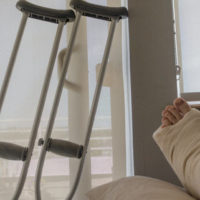How Bifurcation Can Affect Your Personal Injury Trial

Personal injury cases involve very sensitive information and strong emotions, as the injured victims and their families fight to have their stories told and receive the compensation they deserve. All personal injury trials have two distinct issues the jury must consider as part of the overall verdict – liability/fault and damages. Injured claimants often do not realize these two matters are separate from each other, legally speaking, since they are typically handled in the same trial. However, sometimes liability and damages are considered in separate proceedings, and judges have broad discretion to order separate trials for purposes of convenience or to prevent prejudice to a party under Florida court rules. This severance is called bifurcation. In addition, parties to a lawsuit have the ability to consent to bifurcation, and defendants are often particularly motivated to make such a request. Injured parties may understandably think that holding separate trials to decide liability and damages will have little impact on the outcome, but that is not necessarily true. At times, both plaintiffs and defendants may have a strategic interest in holding different proceedings to decide these issues. A discussion of the circumstances that could warrant asking for and/or agreeing to bifurcate a personal injury trial will follow below.
Pros and Cons of Bifurcation
The biggest disadvantage bifurcation brings to the personal injury case is the additional time and expense that accumulates when preparing for and presenting two separate trials. More often than not, defendants instigate a request for bifurcation for the purpose of concealing facts about the consequences of the defendant’s negligence from the jury. These consequences could include evidence about ongoing medical treatment a plaintiff needs, or how much money the plaintiff’s family lost due to the plaintiff’s inability to work. However, plaintiffs may want separate trials or be willing to agree to the defendant’s request if the issue of liability is clear and damages are really the more important issue to resolve. On the other hand, if liability is not so certain, it could be advisable to hold off on damages until the defendant’s fault is legally established.
Potential Impact on Personal Injury Cases
From a practical standpoint, bifurcation is almost always bad for the plaintiff, because the jury only hears only part of the story – the defendant’s negligent acts – but not the consequences, i.e., the plaintiff’s damages, which ultimately deprives them of a fair trial. Without knowing the consequences of the negligent acts, juries are unlikely to truly understand the impact of the injury and why it matters so much to the plaintiff, making it more likely for the jury to side with the defendant. For example, in slip and fall cases, the injuries the plaintiff experienced may not be apparent to the jurors. Consequently, unless the jury hears evidence on the type and extent of the injuries the plaintiff sustained (which are presented in the damages portion), they are unlikely to understand why a legal claim exists, and decide in favor of the defendant. To provide another example, in product liability cases the main issue is whether a product was unreasonably dangerous. How can a juror assess a product if they do not know how it injured the plaintiff? The answer is, they cannot. Basically, if jurors do not hear the whole story about both the circumstances of an accident and the aftermath to the victim, they are likely to develop a bias against the plaintiff because they left to imagine what the consequences are. Thus, plaintiffs should fight bifurcation in the majority of personal injury cases. Selecting an attorney experienced in personal injury trials is the best way to ensure a case is fairly and competently presented to the jury on all issues.
Get Help from a Skilled Attorney
If you were injured in an accident because someone else was negligent, contact a personal injury lawyer today to learn if you have a legal claim. The law imposes a duty of reasonable care in certain situations to prevent unnecessary injury, and if you were injured due to a person’s failure to fulfill that duty, you may be owed compensation. The Miami law firm of Pita Weber Del Prado handles a wide variety of personal injury cases, and is available to evaluate your claim. Contact us for a free consultation.
Resource:
floridabar.org/TFB/TFBResources.nsf/Attachments/10C69DF6FF15185085256B29004BF823/$FILE/Civil.pdf?OpenElement



